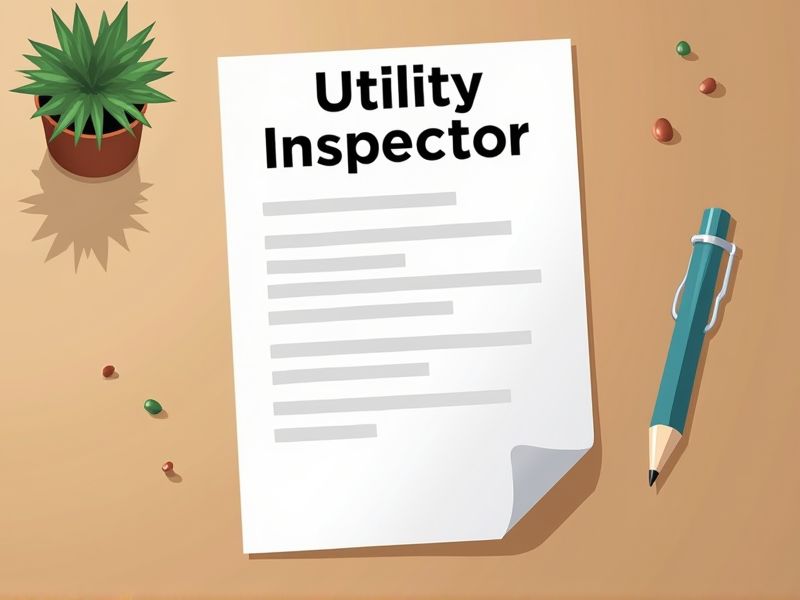
Utility Inspectors ensure that infrastructure projects meet mandated safety and quality standards, thus certifications validate their capability to adhere to those guidelines. The complex nature of utility systems demands that inspectors possess specialized knowledge, which certifications provide through comprehensive training. Certified professionals are often more trusted in the field, reducing liability for companies and improving project outcomes. Essential certifications for Utility Inspectors include those focused on industry regulations and technical skills.
OSHA 10-Hour Construction Safety and Health Certification
The OSHA 10-Hour Construction Safety and Health Certification imparts crucial safety knowledge, reducing the risk of accidents for Utility Inspectors on construction sites. Compliance with safety regulations through certification ensures that Utility Inspectors can identify and lessen job site hazards effectively. Certification builds credibility and trust among employers and co-workers, enhancing cooperation and communication in hazardous environments. Training aligns Utility Inspectors with industry standards, promoting a safer overall construction environment and minimizing potential liability issues.
OSHA 30-Hour Construction Safety and Health Certification
Employers often require OSHA 30-Hour Construction Safety and Health Certification for utility inspectors to ensure they fully understand worksite hazards and safety regulations. Thorough knowledge of safety protocols reduces the risk of accidents and promotes safer work environments. Inspectors with this certification are better equipped to identify non-compliant practices, thereby maintaining regulatory compliance. Possessing the certification often enhances job prospects, as it demonstrates a commitment to safety standards and professional development.
Certified Utility Locator Specialist (CULS)
A Certified Utility Locator Specialist (CULS) is essential for a Utility Inspector because accurate location of utilities prevents accidental damage during excavation. Proper utility mapping by a CULS ensures the safety of construction workers and surrounding community. Misidentifying utility lines can lead to costly repairs and project delays. Expertise in utility location reduces the financial risk associated with construction projects.
National Electric Safety Code (NESC) Training Certificate
A National Electric Safety Code (NESC) Training Certificate equips utility inspectors with the necessary knowledge to ensure compliance with safety protocols, reducing the risk of electrical hazards. This certification provides inspectors with a standardized understanding of safety regulations, which is crucial for evaluating and maintaining utility infrastructure. Without proper training, inspectors might overlook critical deficiencies that could lead to service disruptions or accidents. Securing the NESC certificate signifies that an inspector has met the industry's safety standards, enhancing their credibility and effectiveness in field assessments.
AWWA Drinking Water Distribution Operator Certification
The AWWA Drinking Water Distribution Operator Certification ensures that utility inspectors possess the necessary knowledge to manage and maintain water quality standards. Certification validates the inspector's proficiency in identifying and mitigating potential health risks associated with water distribution systems. By earning this certification, inspectors demonstrate their commitment to adhering to regulatory compliance and industry best practices. Certified inspectors are better equipped to implement effective and safe water management strategies, which supports public health and environmental safety.
AWWA Water Treatment Operator Certification
AWWA Water Treatment Operator Certification ensures a Utility Inspector possesses the necessary knowledge of water treatment processes and safety standards. This certification provides credibility, which can increase public trust in utility operations. Without it, a Utility Inspector might lack the technical proficiency needed to evaluate and ensure the quality of water systems. Certified inspectors are often preferred by employers, which can lead to better job opportunities and professional growth.
Certified Underground Utility Inspector (CUI)
A Certified Underground Utility Inspector (CUI) ensures compliance with safety and quality standards in utility projects, reducing the risk of accidents and costly repairs. Having a CUI helps detect defects and irregularities early, minimizing potential disruptions in service provision. CUIs provide expert validation, instilling greater confidence in the project's structural integrity among stakeholders. Their specialized knowledge supports efficient project execution, ensuring adherence to regulatory requirements and best practices.
Geographic Information System (GIS) Professional Certification
Holding a Geographic Information System (GIS) Professional Certification equips a utility inspector with advanced spatial data analysis skills, enhancing their ability to assess infrastructure accuracy. The certification demonstrates proficiency in utilizing GIS technology, ensuring more precise identification of utility network issues. Being certified can lead to improved compliance with safety and regulatory standards due to a better understanding of spatial data. Employers often prefer certified professionals, as they are perceived to bring a higher level of expertise and reliability to the role.
Certified Construction Health and Safety Technician (CHST)
The construction industry is inherently hazardous; thus, having a Certified Construction Health and Safety Technician (CHST) ensures that utility inspectors can proactively identify and mitigate risks, reducing the likelihood of accidents. A CHST brings specialized safety knowledge, making them adept at enforcing compliance with safety regulations and protecting workers' well-being. By certifying as a CHST, utility inspectors enhance their credibility and expertise, which may lead to fewer project delays due to safety concerns. Increased safety awareness and protocol adherence leads to improved project outcomes, lowering overall costs related to workplace injuries and liabilities.
National Incident Management System (NIMS) Certification
The NIMS Certification is essential for Utility Inspectors because it ensures they understand standardized procedures and terminology crucial during emergency response scenarios. With this certification, Utility Inspectors are equipped to coordinate seamlessly with other emergency services and agencies, minimizing misunderstandings and inefficiencies. The adoption of NIMS guidelines enhances the safety and effectiveness of operations, especially when dealing with incidents of national significance. Moreover, having NIMS-certified inspectors aligns utility companies with federal standards, often making them eligible for governmental support and funding during emergencies.
Summary
You can anticipate increased efficiency when a Utility Inspector obtains certifications. Their specialized knowledge often leads to more accurate inspections, which reduce systemic inefficiencies. Improved inspection quality typically results in fewer compliance issues and costly repairs. Access to advanced tools and techniques may further streamline day-to-day operations.
